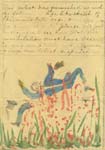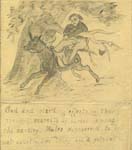Centre During the Age of Lincoln
Exhibition Designed by Anastasia Knight, Class of 2003
I. Chapin Bartlett
Irving Chapin Bartlett was a member of the class of 1862. He was a member of the Chamberlain Literary Society, inducted in 1858, and also a member of Alpha Kappa Phi, inducted in 1859.
The Faculty Minutes of June 25, 1860, record an incident involving Bartlett:
"Bartlett summoned to answer for a quarrel with a fellow student. it appearing from his own statement to the Faculty, as well as the testimony of Mr. Benjamin R. Forman, that on a Sabbath night after Church, he sought the room of Mr. Smith to call him to account for an alleged insult to a lady, that on entering he apologized to Mr. Forman, the roommate of Smith, for coming on such an errand, but saying it could not be helped as long as he had such a skulking piece of humanity for a roommate. Then demanding of Smith what he meant by writing insulting notes to ladies, when Smith denied that he had, & referred to Messrs. Forman & Fox who could prove that he had not. Bartlett reiterated that he had, and that it was a d--d doggish trick. Smith then said that he had no arms, when Bartlett replied that he had none except what nature had given him, & then struck Smith, when they clinched, but were parted by Messrs. Fox & Forman. It was thereupon resolved that in view of all the facts in the case, with the aggravating circumstances, Mr. Bartlett receive a public reprimand before the College when reassembled next session."
At the time that these particular letters were written, Bartlett was boarding with President Green and his family. After graduating in 1861, he enlisted in the Confederate Army and became part of Morgan's Raiders.
Letter to Uncle, November 2, 1860
"Politics are waxing very warm in this part of the state. The students had appointed a meeting for yesterday for the purpose of drafting resolutions expressive of their sentiments upon the question of the day, but the faculty broke us up. We met yesterday week for the same purpose but on some of the senior brethren, myself among the number advocating an adjournment for deliberation the house finally agreed upon it. In the language of Felix of Biblical notoriety, I am almost persuaded to be a Secessionist, ere long I expect I will be not only almost, but altogether such as thou art. Your case will soon be decided by Congress now I suppose. Are you acquainted with Hon. W.C. Anderson, M.C. from this district? Why didn't you express your approbation of [illegible word] intention of going with you and the Dr. to the Islands. He as [has] already consented to it, and you might as well 'cave in' at once."
Letter to Father, February 7, 1861
"Some of the citizens of Danville will raise a "union pole" on Saturday. I have heard of a conspiracy among the students to cut it down. I understand that the secessionists intend raising one on the corner opposite that on which the union pole stands, which is to be much longer, larger, etc. So you see 'Little Brittain' is not behind in showing her colors."
Letter to Father, February 24, 1861
"I received your letter on the evening of the 22nd and found three dollars enclosed. I have not however had any very extensive need of money; will pay my wash bill in the morning. Well, Washington's birth day passed off very pleasantly indeed, and as the speakers at Dr. Greens suggestion uttered nothing which was displeasing to the community the apprehendended [apprehended] disturbance did not occur. Chenaults subject, 'The preservation of its honor - a nation safeguard' would seem to apply to the South and whilst equal rights or Secession was his real sentiments, he covered it so artfully that no one could feel authorised [authorized] in taking offence. At the conclusion of his speech, two Palmetto flags were sent up to him bearing the inscription 'Equal Rights' some six or seven voices hollered take it out and several hisses were heard, but the body of the students who went armed, threw up their hats, cheered and indicated very plainly their sentiments. No violence was offered. Most of the speeches were intensely union.
At the supper table on the evening of the 22nd, Mrs. Green was expressing her hopes that the band would play the "Star Spangled Banner" whilst the congregation joined in singing it. I happened to be sitting next to her, when she turned to me and asked me if I didn't think it would be beautiful and if they would all enjoy it. I told her I thought it beautiful. 'But wouldn't you all enjoy it' she said. I then remarked that I had no doubt but that some of the audience would enjoy it hugely. She looked greatly surprised - and the Dr who sat immediately opposite wanted to know what I said - I repeated it. My look plainly indicating my meaning. The old folks are just beginning to discover that they are nurturing instead of a band of patriots, union loving men, a hot bed of secessionist and advocates of a southern confederacy."
















